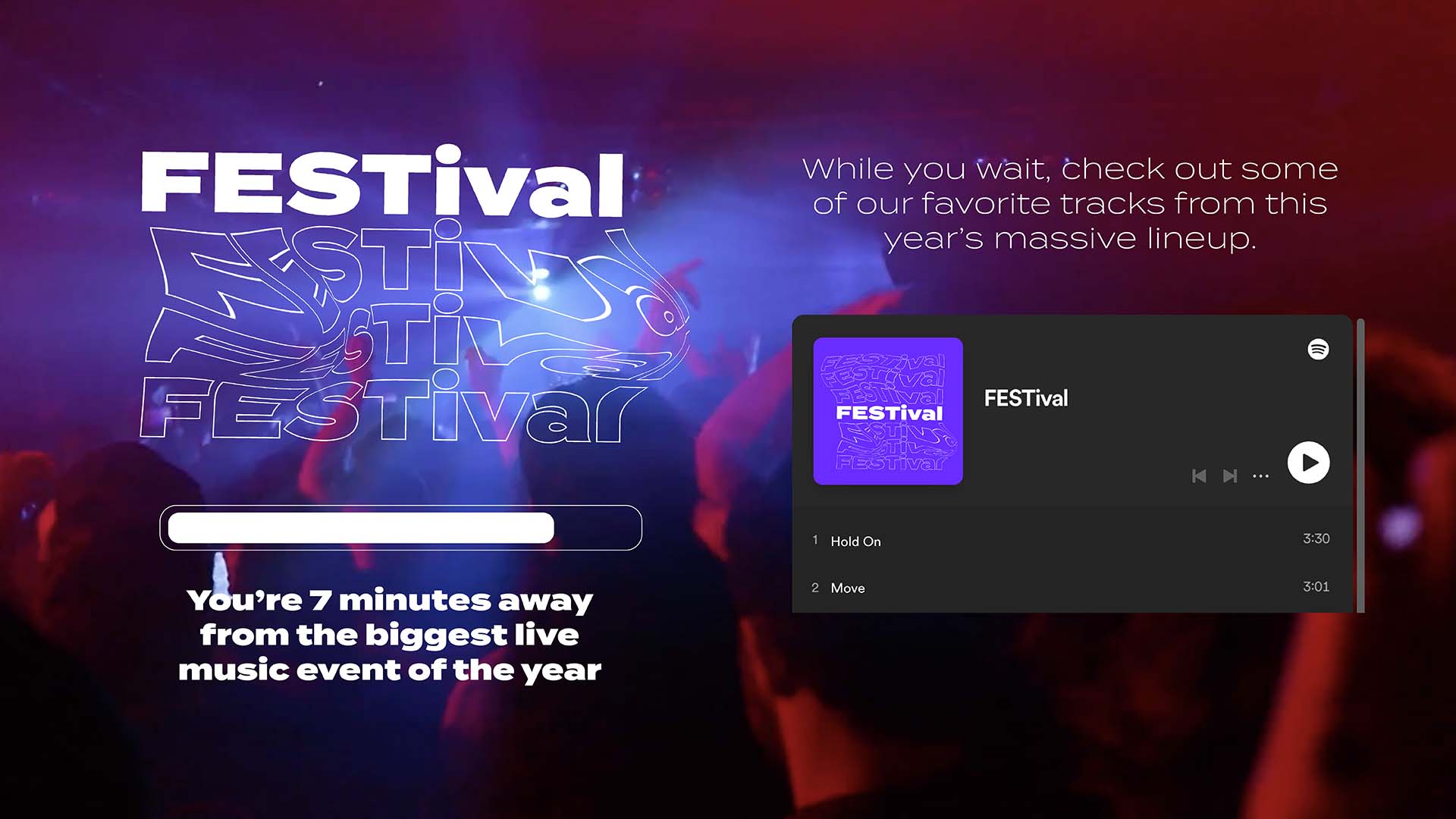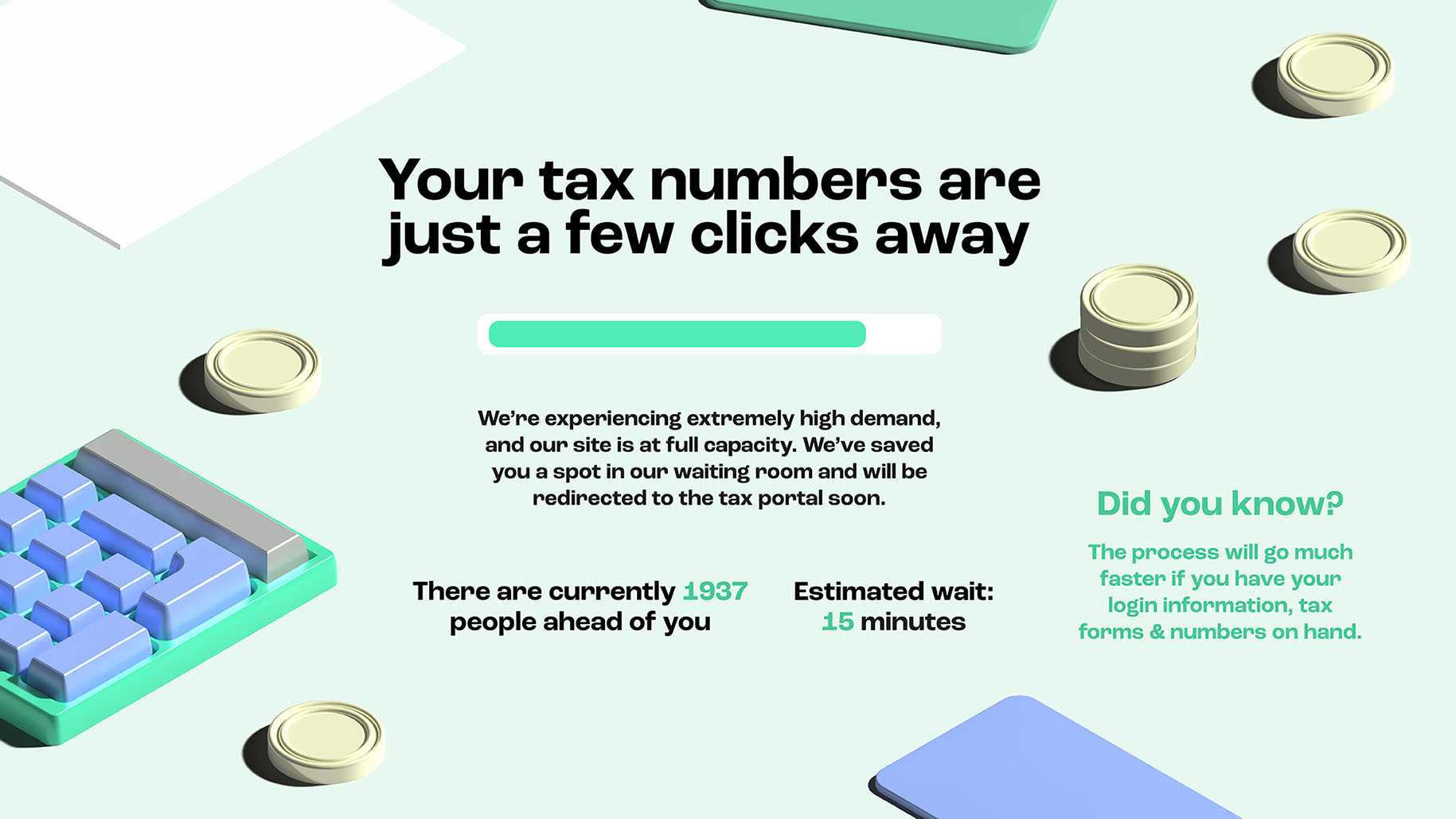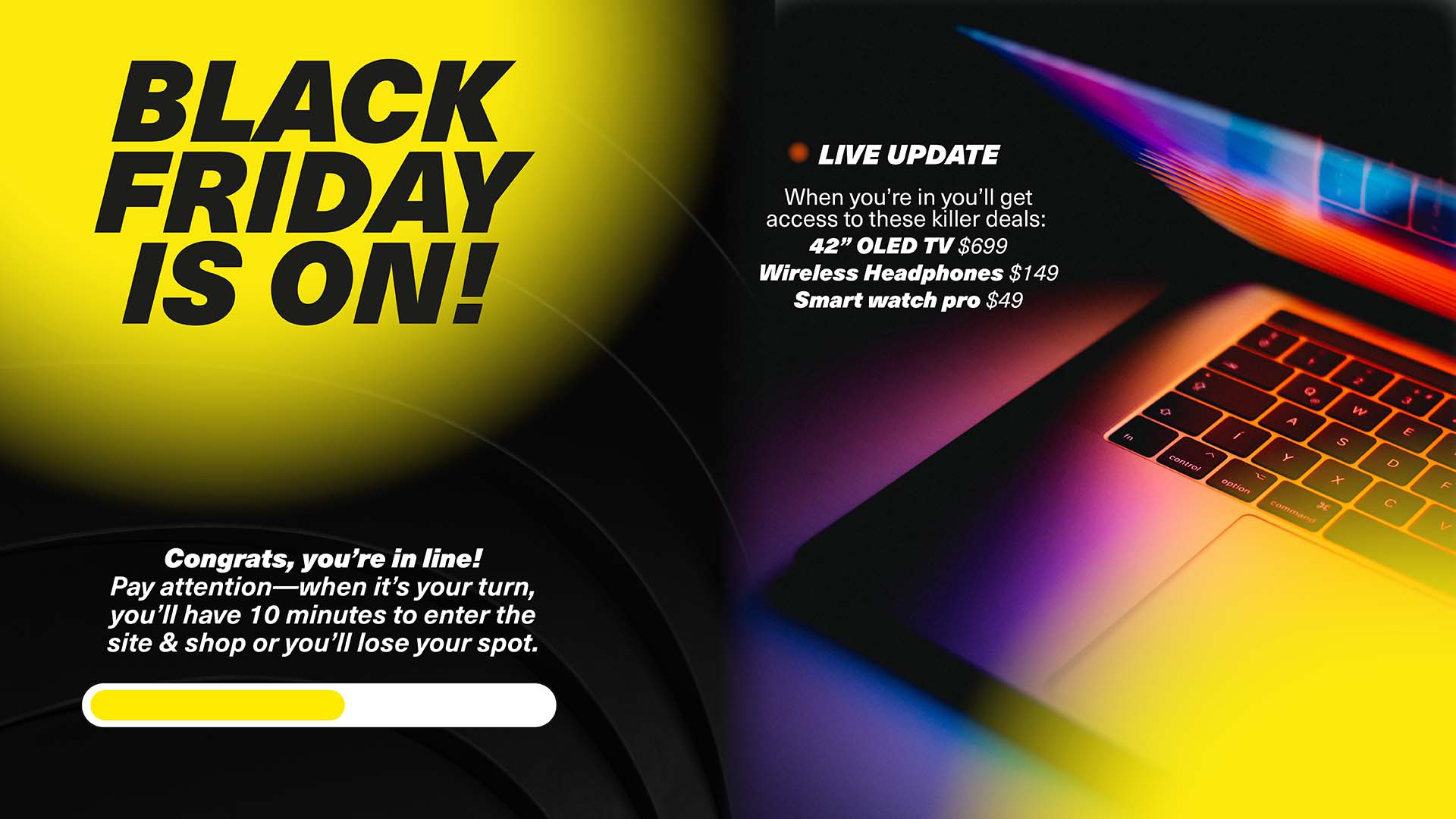Online queuing system
Prevent traffic from overloading your site with an online queue system
An online queue system (also known as a virtual waiting room or web queue system) is a powerful tool to control your online traffic & ensure a smooth & fair customer experience during peak demand.
An online queue system is a cloud-based service that empowers businesses to control surges in online traffic to their websites or mobile apps.
Website queuing systems keep sites running smoothly during peak demand by redirecting visitors to an online queue, before flowing them back to the website at the rate you choose.

Online queues work by redirecting online visitors to a queue when they exceed your website's capacity using a HTTP 302 redirect. Visitors experience a short, informed wait, then are flowed back to your site or app in a controlled, first-in, first-out order.
By controlling the rate at which visitors get access to your site, you can prevent issues caused by spikes in traffic, such as site crashes, slowdowns, errors, and overselling.
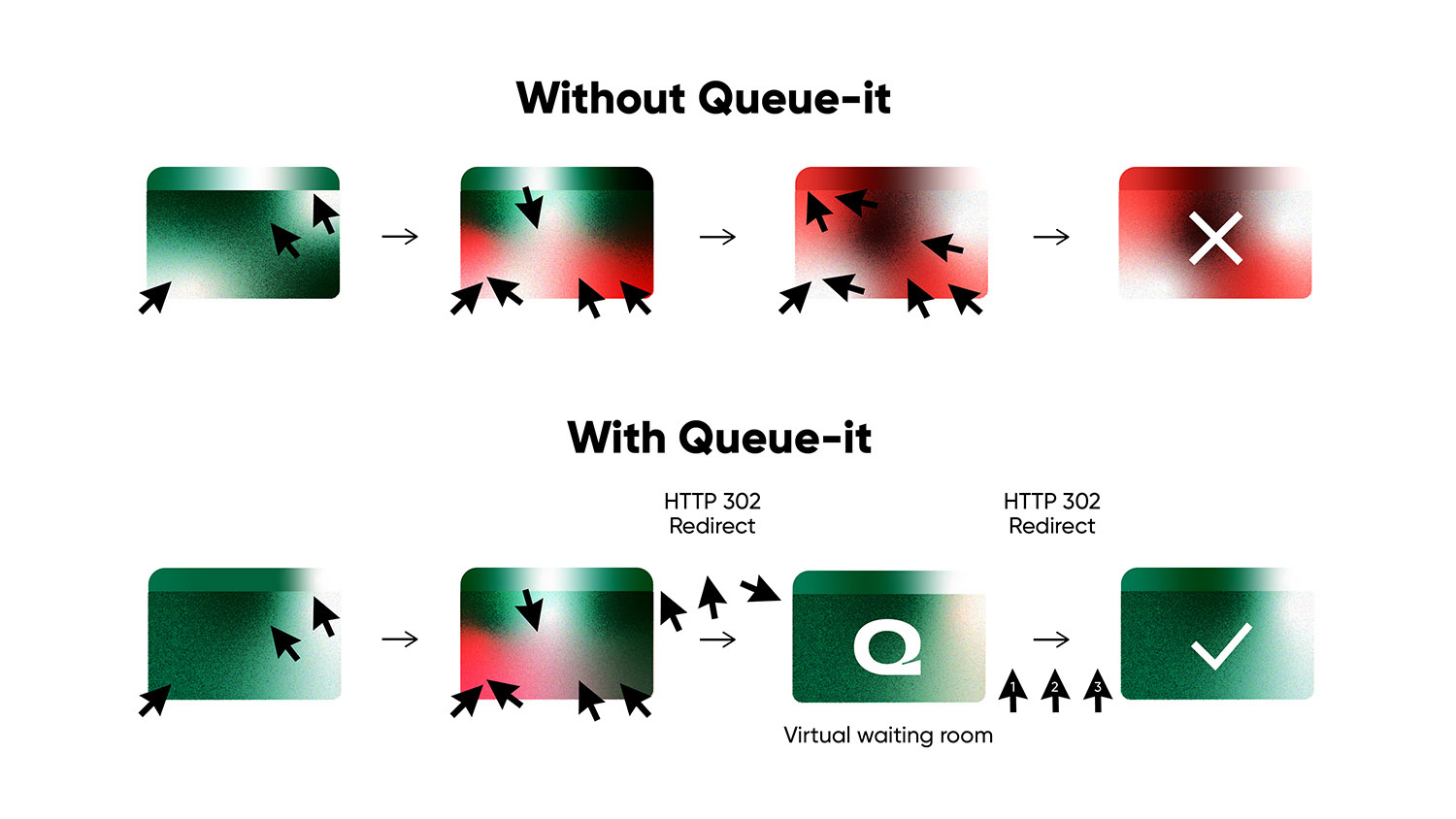
- Implement the website queue in front of key bottlenecks in your user journey, like “Add to Cart”, login, checkout, or a specific landing page
- Get key metrics in real time like traffic inflow per minute, when the queue kicked in, average wait time, and number of customers waiting
- Adjust traffic flow up & down on the fly based on how your systems are performing
- Give customers peace of mind with transparent wait info like place in line & estimated wait time
- Match your brand image by adding your logo, font & colors together with a custom waiting room background, progress bar & wait info display
- Communicate in real time to set expectations, let customers know what inventory is left & share updates on sale progress
- Add a security checkpoint to your flow that gives you the chance to slow down bots & run security checks like Proof-of-Work challenges or data center hard blocking
- Proactively verify trusted visitors by tying waiting room access to a unique identifier like email address, user ID, or promo code
- Eliminate the speed & volume advantages bots rely on with pre-queue randomization & mitigation tactics

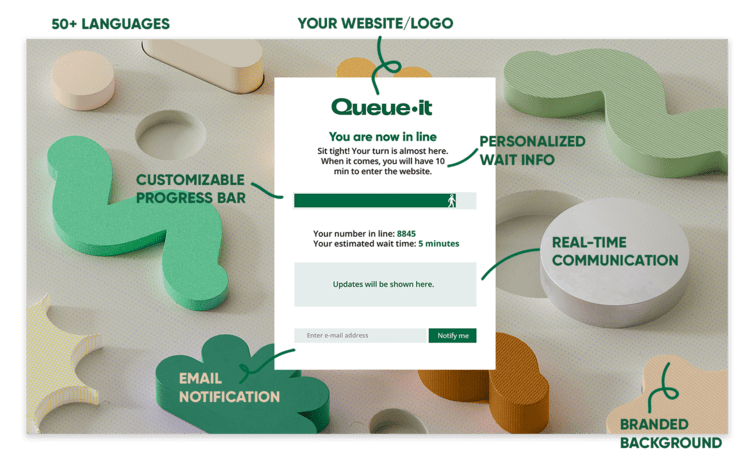

35%
average reported savings on server scaling with Queue-it in place
86%
of respondents say their customers online experience improved after using Queue-it
50%
average reduction in staff needed on-call during sales, freeing them to drive added business value
Online queues work by redirecting site visitors to a waiting room that enables a controlled flow of traffic to your site or app. Queue-it's online queue can be used:
- As a safety net that only activates when a traffic threshold is reached (the insurance play)
- For scheduled sales where you anticipate a traffic spike (the timed release play)
- Or for exclusive or early access sales where you want to gate access to a page (the exclusivity play)
If you have Queue-it set up as a safety net, customers are redirected to a customizable online queue only when traffic exceeds the capacity you've set. They're then flowed back to your website or app in a controlled, first-in-first-out order.
If your sale or registration is set to start at a specific time, customers are held on a countdown page and then randomized just like a raffle, giving everyone an equal chance. Everyone arriving later gets a first-come, first-served spot in the online queue.
If you're using Queue-it for exclusive access, only the customers you've chosen can access the queue and the protected page. Customers can verify they're "invited" with either a unique single-use link or their email address.
When visitors are placed in the online queue depends on how you set up Queue-it.
First, you can choose whether the waiting room should be “Always Visible” or “Visible at Peak”. If you choose “Visible at Peak”, the online queue will activate only when traffic inflow (in visitors per minute) exceeds the threshold you've set.
Second, you choose the parts of the user flow that Queue-it covers. This could be your entire website, a landing page, the login page, or a dynamic request like when customers click “Add to Cart”. This way, you queue visitors only at the stage in the user journey that needs protection, while visitors who haven’t taken the protected action can browse the site normally.
Queue-it uses both first-in, first-out (FIFO) queuing and randomization to create a fair experience for your customers.
When the online queue is used as a safety net and activated by traffic spikes, it operates as a FIFO queue.
When the online queue is used for scheduled sales, early visitors are placed in a pre-queue with a countdown timer. When the timer hits zero and the sale or registration begins, visitors are given a randomly assigned position in queue. Once these positions are assigned, the queue operates in FIFO order, meaning those who arrive after the sale begins are placed at the back of the queue.
This combination of randomization and FIFO queuing for scheduled sales ensures all visitors who show up on time get an equal chance at first access and prevents speedy bots from getting an unfair advantage.
You choose the traffic outflow level, measured in visitors per minute, and can adjust it up or down on-the-fly using Queue-it's API or web-based admin platform.
The best way to determine your outflow is to use a load test. If you haven't run a load test, Queue-it's peak traffic experts bring years of expertise in identifying system bottlenecks, understanding how many visitors your infrastructure can handle, and recommending a starting outflow level that's optimal for your site's performance.
You can integrate Queue-it with a client-side, server-side, edge, or mobile SDK connector. Queue-it offers over 25 connectors and dedicated support staff for implementation.
Yes, Queue-it can be used on mobile devices and integrated into iOS, Android, Cordova, or React Native app frameworks. Visitors on a desktop can even transfer their position in queue to their mobile device if they need to queue on the go.
The virtual waiting room (online queue) is a lightweight solution built specifically to avoid bottlenecks and handle extreme load, meaning holding users is less resource-intensive than on typical sites or apps.
Queue-it is cloud hosted, with several dedicated global AWS data centers, enabling high levels of scalability and eliminating single points of failure. Queue-it processes an average of 200 million visitors daily.

